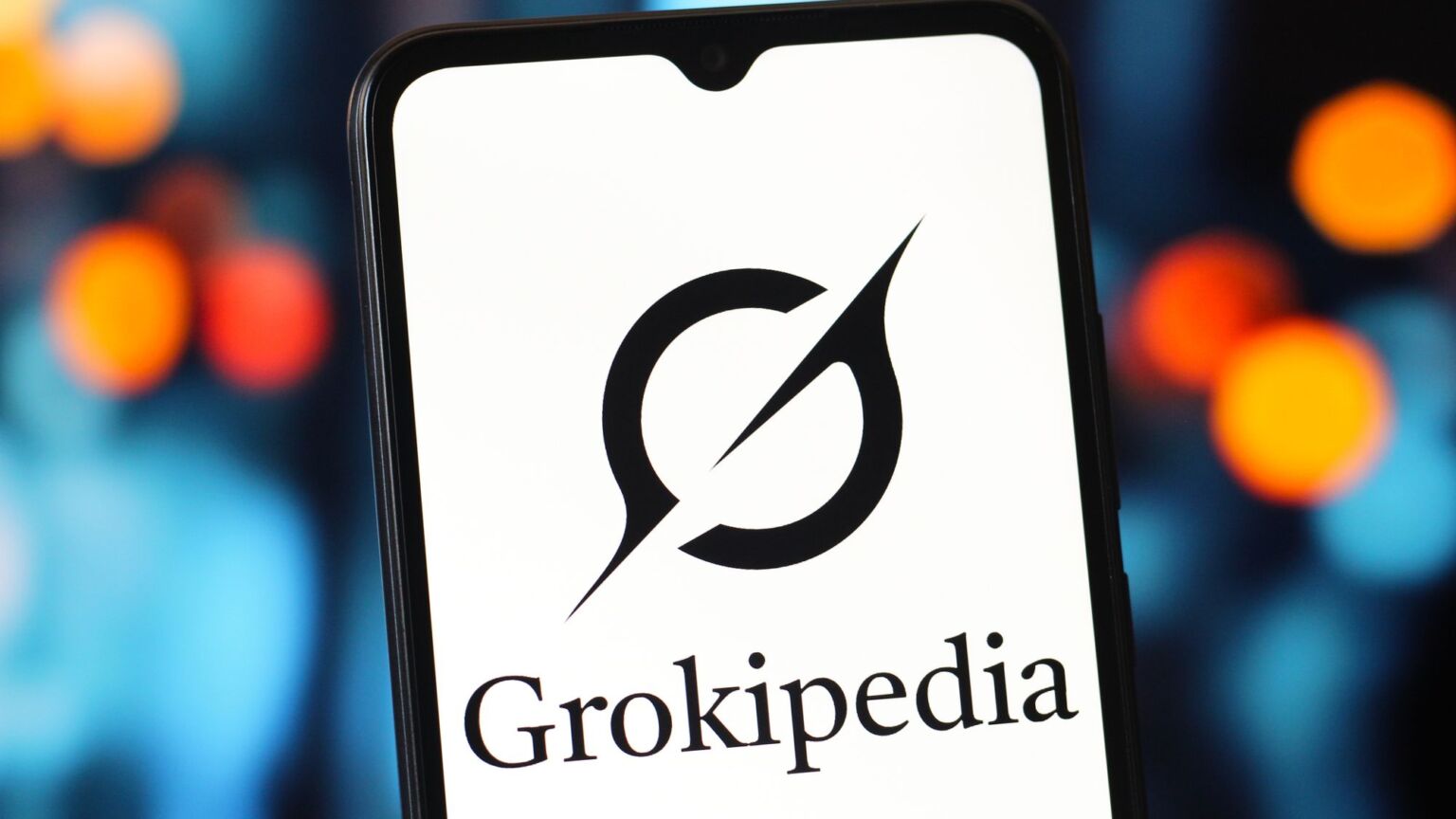Elon Musk takes on woke Wikipedia
Grokipedia is a necessary, if flawed, corrective to Wikipedia’s blatant bias.

Want unlimited, ad-free access? Become a spiked supporter.
The latest instalment of the Elon Musk cinematic universe has just dropped. This week, Musk’s artificial intelligence start-up, xAI, launched the first version of Grokipedia. Powered by X’s built-in AI, Grok, the online encyclopaedia aims to be the right-wing answer to Wikipedia, which many view as having been captured by activists with an agenda. The goal of Grokipedia, at least according to Musk, is ‘the truth, the whole truth and nothing but the truth’.
So far, Grokipedia is something of a mixed bag. Commentators were quick to point out that many of the pages are lifted word-for-word from the actual Wikipedia. Some contain mistakes that range from grammatical errors to invented biographical details of living people.
It’s also clear that, despite Musk’s claims of Grokipedia being an ‘unbiased’ alternative to Wikipedia, he hopes to use this as a platform for his own views and pet causes. The article on the 2022 Russian invasion of Ukraine, for example, cites a speech by Vladimir Putin to justify his ‘special military operation’ as being in aid of ‘demilitarising and denazifying Ukraine, protecting ethnic Russians and Russian speakers from alleged persecution in Donbas, and preventing Ukraine’s integration into NATO to neutralise threats to Russian security’. Similarly, the entry for Apartheid spends an uncomfortable number of paragraphs attempting to ‘debunk prevailing narratives’ that depict ‘Apartheid as a system of unremitting total oppression for black South Africans’.
More amusingly, the entry for Musk himself (which clocks in at 11,000 words) comments on his ‘reported 20lb weight loss’ and penchant for ‘weightlifting and strength training’. This is even after Grokipedia’s launch was delayed by a week in order to, in Musk’s own words, ‘purge out the propaganda’.
None of this should be surprising from an AI-powered encyclopaedia. AI is prone to ‘hallucinating’ misleading or outright false information. It can, after all, only work with data that are fed to it. Unlike human beings, it has no innate ability to discern truth from fiction. Grok cannot deploy the sniff test. And, given that xAI’s Grok chatbot has previously gone off the rails, calling itself ‘MechaHitler’ and threatening to violently sexually assault a left-wing commentator, it probably shouldn’t be trusted to act as an online fount of knowledge.
That being said, there are a lot of things that Grokipedia gets right over Wikipedia. Musk was certainly not wrong when he criticised the original internet encyclopaedia as being ‘controlled by far-left activists’, as he did in 2024. Wikipedia’s editors have taken it upon themselves to mould reality to fit their worldview, writing articles to suit a certain ideological slant and preventing any edits that challenge this.
There is a glut of examples. Last year, the entry for the UK grooming-gangs scandal was titled ‘Grooming-gang moral panic in the United Kingdom’, before enough fuss was kicked up on social media for the editors to change it. The Wikipedia entry for the Twitter Files – leaks that proved the social-media platform had been instructed by Joe Biden’s campaign team to censor the Hunter Biden laptop story, among other things – displays a similar partiality. It describes the leaked documents as demonstrating ‘little more than Twitter’s policy team struggling with difficult decisions, but resolving such matters swiftly’, while dismissively mentioning that ‘some conservatives said that the documents demonstrated what they called Twitter’s liberal bias’. In a similar vein, the Wikipedia article on the origins of Covid-19 refers to the idea that the virus came from a lab as not being ‘supported by evidence’. The editors imply that the lab-leak theory, which has since been accepted as likely true by the CIA and other foreign intelligence services, is merely a ‘conspiracy theory’. Perhaps most egregiously, the Wiki page for Charlie Kirk, the free-speech activist assassinated last month, calls him ‘far right’ and a ‘conspiracy theorist’.
Few have been more critical of Wikipedia’s woke turn than Larry Sanger, a co-founder of the site. Last month, he nailed his ‘Nine Theses’ to Wikipedia’s digital door, detailing how he would reform Wikipedia and free it from the ‘anonymous editors who manipulate articles to fit their ideological biases’. He had also previously lamented the fact that the site he helped create with the aim of sustaining a ‘free and open’ internet was becoming ever more censorious.
Part of this was down to the biases of individual editors, but there was pressure from above, too. Until last year, the CEO of the Wikimedia Foundation, which raises funds for Wikipedia, was Katherine Maher, a woman who openly admitted that she doesn’t believe in objective truth. In a 2021 TEDTalk, she told the audience that ‘our reverence for the truth might be a distraction that’s getting in the way of finding common ground and getting things done’. She went on to claim that ‘the truth exists for you and probably for the person sitting next to you. But this may not be the same truth.’ In other words, truth is subjective – and we shouldn’t let something as trivial as facts hold up the narrative. Unsurprisingly, Sanger’s take on Grokipedia, as of right now, is that it’s ‘maybe’ better than Wikipedia.
The saddest part about the Wikipedia saga is that, in many ways, the encyclopaedia is a hollowed-out artefact of an internet that no longer exists – a place where individuals could collect knowledge, exchange ideas and gather free of corporate interference or ideological pressures. People often describe the old internet – made up chiefly of personal blogs, forums and collaborative projects like Wikipedia – as a kind of Wild West. Today’s internet, by contrast, feels more like a decaying shopping mall. Censorship and overregulation have stripped it of any charm, character and, crucially, freedom.
Wikipedia started life as an ambitious operation to collate a living, breathing hub of all human knowledge. Now, it’s little more than another propaganda organ. Grokipedia may do something to challenge its hegemony – or it might crash and burn. Either way, Wikipedia’s editors only have themselves to blame for the death of the internet’s encyclopaedia.
Lauren Smith is a London-based columnist for the European Conservative.
£1 a month for 3 months
You’ve hit your monthly free article limit.
Support spiked and get unlimited access.
Support spiked – £1 a month for 3 months
spiked is funded by readers like you. Only 0.1% of regular readers currently support us. If just 1% did, we could grow our team and step up the fight for free speech and democracy.
Become a spiked supporter and enjoy unlimited, ad-free access, bonus content and exclusive events – while helping to keep independent journalism alive.
———————————————————————————————————————————–
Exclusive January offer: join today for £1 a month for 3 months. Then £5 a month, cancel anytime.
———————————————————————————————————————————–
Monthly support makes the biggest difference. Thank you.









Comments
Want to join the conversation?
Only spiked supporters and patrons, who donate regularly to us, can comment on our articles.